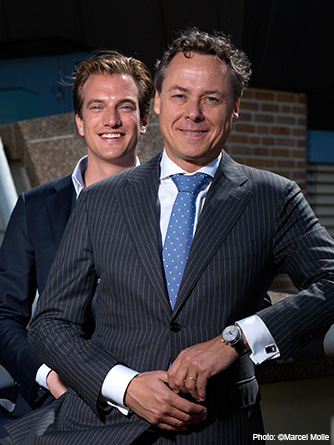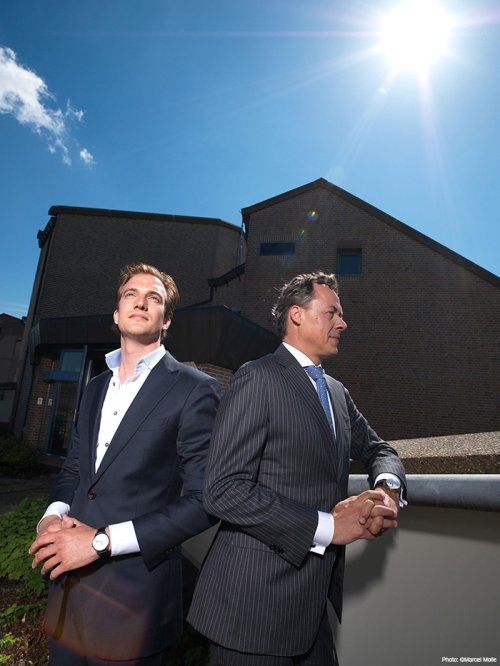The meeting between Ralph Hamers and Jan Bolle
This article was published in the No. 2, July 2014 edition of Bank|Wereld – NVB, the Dutch Banking Association. This is a translation.
After the turbulent years of the financial crisis, the banking sector is once again looking ahead. How do a senior and a junior banker see the future of the banks?
CEO Ralph Hamers of ING Group catches up with Mortgage Product Manager Jan Bolle.
We must dare to say no if that’s better for the customer
On the day US merchant bank Lehman Brothers collapsed, Jan Bolle was offered a contract at ING. Bolle, who had just graduated in economics, started on his first job: trainee in a sector on the eve of one of the biggest crises in its history. “The timing was pretty odd; it made me feel responsible for the sector’s future,” Bolle – now Mortgage Product Manager at ING – recalls.
Bolle has just joined Ralph Hamers, CEO of ING Group since October 2013. The topic of the day is the future of the financial sector. Hamers sees a change in mind-set, both in the sector and society. “Before the outbreak of the crisis, lots of people were borrowing to the hilt; now, by contrast, families, businesses and governments are reducing their debts. It’s good to see this gradual return to thriftier ways. At the same time, banks are strengthening their balance sheets and the culture in the financial sector is changing.”

Jan Bolle (left) and Ralph Hamers
What are the signals of this change in culture?
Ralph Hamers: “The way banks give advice and extend loans is one good example. Banks have a duty of care. This means we must turn customers down if a product or service is not in their best interests, and that is precisely what we do. It may not make us popular in the short term, but in the longer term it is more financially sustainable.”
Jan Bolle: “People are very vocal these days and are quick to voice their opinions on
Twitter or Facebook. This can generate negative publicity. But we must say no if it’s better for the customer. That demands courage.”
Is there any tension between the young and the old guard when it comes to changes in the sector?
Hamers: “Of course there is. That’s only healthy. It drives dynamism and progress. Tension between young and old is always there and everywhere. That has nothing to do with the crisis or with the financial sector.”
Bolle: “Banks are pretty traditional organisations and this can make it more difficult to implement changes rapidly. I definitely sense some impatience among the younger staff in this respect. They would like to move faster. But I wonder whether the contrast between young and old is all that clear and relevant. The key question is whether the organisation can cope with rapid changes.”
Can we move faster?
Hamers: “Changing a culture is not an easy thing to do; the changes take time to bed down. Because people need to adapt their behaviour and they don’t do that readily. So I don’t believe in rapid cultural changes. Cultures develop slowly. Are we moving fast enough? Definitely. Could we be going faster? A little, perhaps. But every cultural change takes three to five years.”
Cultures develop slowly. Are we moving fast enough? Definitely. Could we be going faster? A little, perhaps. But every cultural change takes three to five years.
How far is the sector?
Hamers: “I guess we’re halfway there. It’s good that pressure is being exerted on us. Both internally by the young generation, and by society and politicians. That pressure is vital, to keep us from slackening the pace and thinking too quickly that we have already made it to the finish line.”
The Dutch Banking Association recently unveiled a culture map (see box). What makes that map so important?
Bolle: “Young bankers want to make their voice heard. I was involved in the development of the culture map and it is by no means our final destination. In fact, it actually marks a point of departure for a dialogue with society. It is also a compass that can help bankers in their daily work. And it provides a basis for talking about things in our sector that are not yet going so well.
The banks are making many positive strides forwards and are also communicating about these efforts. But there are still opportunities for being more open about the dilemmas confronting the sector.”
Hamers: “What dilemmas?”
Bolle: “Lending to consumers and businesses and the duty of care, for instance. We as a sector keep a pretty low profile about large dilemmas. You’ll rarely, if ever, see us making our case in popular talk shows on TV like De Wereld Draait Door.”
Hamers: “Is that true? Possibly not in programmes like that. But we are certainly open about our views. In newspapers, for instance, and in parliamentary hearings and we don’t shy away from appearing on critical programmes like Kassa or Radar.”
Which value on the culture map should be given the most attention?
Hamers: “I think service orientation is the most important value on the culture map.
It is the essence of what we do: we are here to serve society. But the value that should perhaps receive the most attention is reliability. Winning back trust is the fundamental aim of all our efforts. Acting reliably and, in so doing, regaining society’s trust is also the outcome of the four other values on the culture map: engagement, integrity, service orientation and ambition.”
Bolle: “I think integrity is a very important value. It means staying close to yourself. But I also fought hard to get ambition added to the culture map. Because once we have succeeded in changing our culture, we cannot afford to become complacent. The world around us is constantly changing.”
Hamers: “Ambition is a bold value. One that needs explaining, because it could easily be misinterpreted. Some people will say: ‘Ambition is precisely why everything went so badly wrong in the financial sector’. But having ambition on the culture map is definitely a good thing. Banks want to do things better for their customers every day. It’s thanks to our ambition, for instance, that the Netherlands has such an efficient payment system.”
Bolle: “We must highlight the good sides of our ambition. When I’m in the pub and tell people I work in the financial sector, I don’t get any positive reactions. In many people’s eyes, the banks can’t do anything right. Strangely enough, though, everybody takes it for granted that they can pay instantly with their smartphone and use their debit card to withdraw cash and buy things all over the world at relatively low costs.”
The sector is slowly but surely shedding its image of easy money and high bonuses. How can the sector remain attractive for young talent?
Bolle: “The financial sector is a complex environment that is going through lots of changes. And its products and services also have a huge impact on people’s lives. For me it is this combination that makes the work challenging. We can genuinely help customers. The salary was not what clinched it for me. What I really like about ING is the open and down-to-earth attitude. It is not a rigid, hierarchical company.”
Hamers: “There is a hierarchy, but we are not a hierarchical company. I agree that the remuneration package is not the decisive factor. Looking at ING, I see a powerful brand that is active in more than forty countries. We are trailblazers in the development of new services for our customers. That’s an exciting environment for young talent to work in.”

Jan Bolle (left) and Ralph Hamers
Jan BolleJan Bolle (1984) studied general economics. He started his career at ING in 2009 as a trainee in the Retail Banking Leadership Programme. Within that programme he worked at Mortgage Product Management, Investment Marketing, ING Turkey in Istanbul and finally as manager of an ING branch in Amsterdam. He has been Mortgage Product Manager since 2011. |
Ralph HamersRalph Hamers (1966) studied business econometrics and has been with ING since 1991. After holding various roles he joined the Executive Board of ING Bank Netherlands in 2002. In 2005 he was appointed as CEO of ING Bank in the Netherlands. In 2007 Hamers became Global Head of the Commercial Banking Network and in 2010 Head of Network Management for Retail Banking Direct and International. In March 2011 he was appointed as CEO of ING Belgium and Luxembourg. He has been CEO of ING Group since October 2013. |
